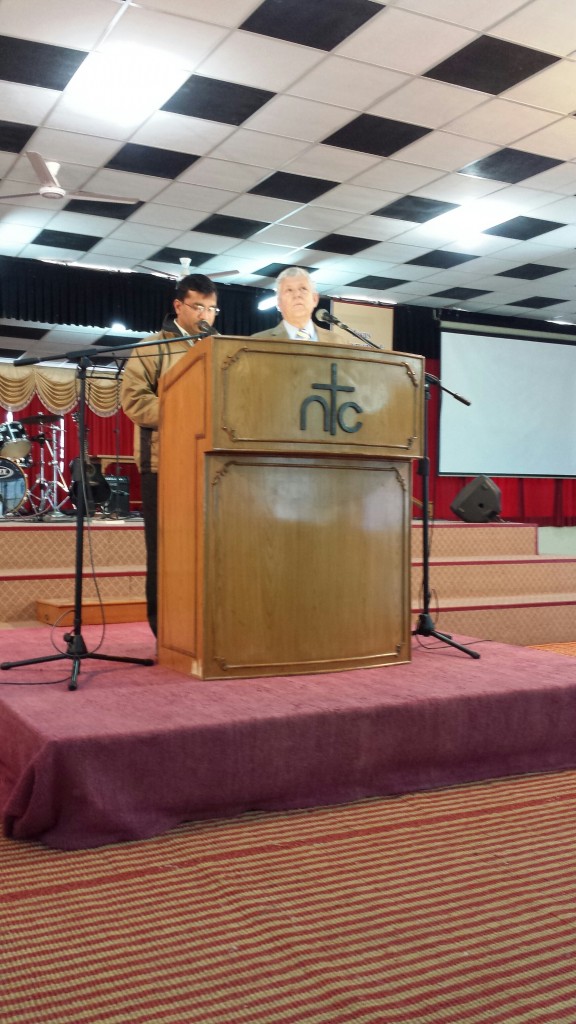(That’s me preaching on Phil. 2.4-11 and Sam is translating it into Hindi).
That’s me preaching in yet another country last Sunday. Somehow the list has gotten long. This month I added India to the list of where I’ve preached and taught. I did not realize when I signed up for the itinerant Methodist thing, that it would involve going to dozens of countries. I was thinking a dozen appointments perhaps in good ole North Carolina. Something happened along the way, chiefly because my books are being used all over the place and that led to lots of invitations. I neither planned this, nor foresaw it happening. I am neither a prophet nor the son of a prophet. But I am a learner, and here are a few things I’ve learned from being all over the map (my students kid me that I should invent a game called Where’s Witherington?).
1) The world is rapidly shrinking in part due to the Internet, and the economies are increasingly intertwined. In such a world, parochial thinking is increasingly becoming, or should become like the dodo— extinct. This is especially true for Christians, wherever they are. Their primary allegiance should not be to some particular nation, or tribal identity, or physical family identity etc. As Paul says our commonwealth is in Christ, and our primary family identity is our Christian family of faith, wherever they are in the world. There is nothing wrong with having lesser loyalties like love of one’s nuclear family, or one’s nation. But they are lesser loyalties for a Christian, and they should not be allowed to trump or dictate the priorities of a Christian. God’s call on the person’s life and God’s people are primary.
2) Sociologists who are interested in social identity theory talk a lot about ones primary and ones secondary identity. When a crisis comes, one finds out which is which. I remember vividly on the Sunday after 9-11 when I was doing a revival in Garrard County here in Kentucky, hearing the news story about the preacher who got up into his pulpit on the West Coast and said “I’m an American first and a Christian second, bomb those ******* back into the Stone Age.” When asked about this after the service by a deacon in the church the pastor repeated what he said with fervor. Guess which identity was his primary identity, and which was his secondary identity? The sad truth is, for many Americans who call themselves Christians that is the order of things in their lives as well. When real religion wanes in a culture, civic religion often becomes the primary religion.
3) People are people everywhere, all created in God’s image, all people for whom Christ died on the cross, all people whom God loves. There are also Christians by the thousands in all the countries I have preached and taught in, and this includes in the Middle East. When we blindly support the use of drones and blowing up of other countries, and wars in other countries, more often than not we are supporting the killing of our fellow Christians who are in harm’s way, but are not usually the cause of our wrath. I find this a completely unacceptable form of blindness. Jesus said his followers should lay down their lives for one another, not find ways to take one anothers lives. What’s the solution? Christians should refuse to participate in such wars or strikes etc. Its bad enough when a Christian has blood on his or her hands. That produces enough guilt. But when one knowingly kills other members of the body of Christ, that’s beyond the pale.
4) In a global village, it should be required of all Christians that they do their best to get to know some people who are not like them. They should cultivate a certain sense of cultural vertigo, entering sympathetically into the lives of people in other cultures, other countries, other communities. When you do this, it becomes increasingly difficult for a Christian to objectify those people as merely ‘them’ or as ‘the enemy’, and when that becomes difficult it becomes equally difficult to justify destroying ‘them’. Am I my brother’s keeper? You bet you are if you are a genuine Christian.
5) A Christian should not only be committed to non-violence, he or she should be committed to active pursuit of alternate solutions to violence. Call it the activist pacifist agenda. We will talk much more about this later in the month, when we will post some guest posts on non-resistance and the Christian faith. Stay tuned.
6) A Christian should make it a priority to visit, and to work, at least by way of short term missions, in another country and see how the other 90% of the world lives. In India I saw a lot of grinding poverty, pollution, and over population. We have an obligation as Christians to work for solutions to these problems (remember the parable of the sheep and goats and where Jesus said he could be visited, seen, found?). It is not enough to say to one’s heart, ‘boy am I glad I don’t live there and live like that’. It is required that a Christian with a conscience ask— What’s wrong with this picture?
7) We are God’s ambassadors for Christ. It is indeed our responsibility when we travel to model good Christian behavior, not be the ugly American abroad, seeking to rip off people trying to make a living above subsistence level, by buying things as cheaply as possible— call them souvenirs. I’ve seen Christians shame carpet dealers, leather salesmen, stone carvers, artisans who make beautiful objects, by haggling with them until you ask them to sell their goods below cost, and at a loss of profit. Consider for a moment that these persons have spent many hours making beautiful things, and they too have families to feed. We should be generous, kind, friendly, loving, compassionate and always on our best behavior abroad. We not merely represent America, we represent the Lord.














